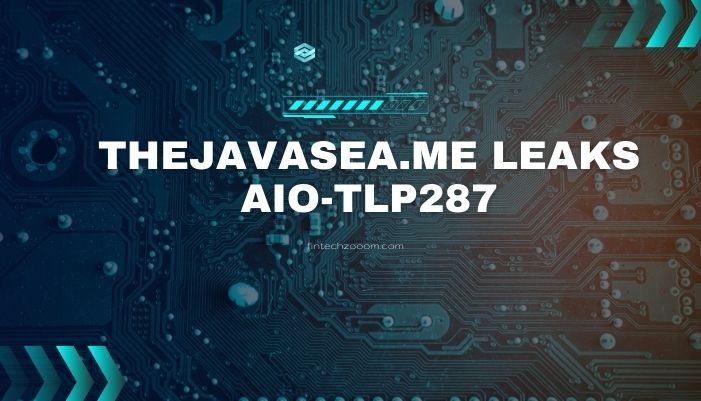Data leaks have become a serious concern in today’s digital world, with cybercriminals constantly finding ways to exploit security loopholes. One of the latest incidents to grab attention is Thejavasea.me Leaks AIO-TLP287.
This breach has raised questions about cybersecurity, privacy, and legal implications. In this article, we will explore everything you need to know about this leak, its impact, and how to protect yourself.
What is AIO-TLP287?

AIO-TLP287 is a specific data set or file that has been leaked on Thejavasea.me. While the exact nature of the file may vary, such leaks typically contain sensitive user information, confidential business data, or other private materials.
Cybersecurity experts believe that AIO-TLP287 could be a part of a larger data breach, leading to severe consequences for affected individuals or organizations.
Thejavasea.me: What You Need to Know
Thejavasea.me is a website known for hosting leaked data and confidential information. While some users see it as a platform for whistleblowing, others view it as a hub for unauthorized data distribution.
Websites like these often operate on the dark web or hidden networks, making it difficult for authorities to take them down.
The Leak: What Was Exposed?
The AIO-TLP287 leak reportedly includes:
- Usernames and passwords
- Email addresses
- Financial information
- Company documents
- Personal identification data
The exposure of such information can lead to identity theft, financial fraud, and corporate espionage, making it crucial to understand the risks associated with this breach.
The Impact of the AIO-TLP287 Leak
For Individuals
- Increased risk of identity theft
- Unauthorized access to personal accounts
- Financial loss due to fraudulent transactions
For Businesses
- Damage to brand reputation
- Legal repercussions for failing to protect user data
- Loss of trust from customers and stakeholders
For the Cybersecurity Industry
- Greater emphasis on tightening security measures
- Increased awareness about data protection practices
- Growing demand for cybersecurity professionals
Why Do Leaks Like This Happen?
Several factors contribute to data leaks, including:
- Weak passwords and lack of encryption
- Phishing attacks that trick users into sharing credentials
- Insider threats from employees or former employees
- Vulnerabilities in software or outdated security measures
- Cyberattacks such as hacking and malware infiltration
Legal and Ethical Concerns
Legal Implications
- Companies responsible for data breaches may face fines under laws like GDPR (General Data Protection Regulation) and CCPA (California Consumer Privacy Act).
- Individuals involved in hacking or unauthorized access can be prosecuted under cybercrime laws.
Ethical Considerations
- Is it ethical to expose private information, even in the name of transparency?
- How can companies balance security with public interest?
- Should platforms like Thejavasea.me be allowed to operate?
Preventing Future Leaks: Key Security Measures
Organizations and individuals can take the following steps to prevent data breaches:
For Businesses:
- Implement strong encryption and multi-factor authentication
- Conduct regular security audits
- Educate employees about phishing and social engineering attacks
- Restrict access to sensitive data
For Individuals:
- Use strong, unique passwords for each account
- Enable two-factor authentication (2FA)
- Avoid clicking on suspicious links or downloading unknown files
- Regularly update software and security patches
Industry & Public Reactions
How Companies Respond to Such Leaks
- Notifying affected users immediately
- Offering credit monitoring services to prevent identity theft
- Strengthening cybersecurity infrastructure
Public Concerns and Discussions
- Users expressing frustration over lack of data protection
- Debates on the responsibility of companies to safeguard data
- Calls for stricter regulations and penalties for data breaches
FintechZoom Markets: The Ultimate Guide to Financial Insights
Final Thoughts
Thejavasea.me Leaks AIO-TLP287 serves as a stark reminder of the importance of cybersecurity. Whether you’re an individual, a business owner, or a tech enthusiast, staying informed about data breaches and security practices is essential. By taking proactive measures, we can minimize the risks and protect our digital identities.
FAQs
1. What should I do if my data is part of a leak?
If you suspect that your information has been leaked, immediately change your passwords, enable two-factor authentication, and monitor your accounts for suspicious activity.
2. How can I check if my email or password has been leaked?
You can use websites like Have I Been Pwned (https://haveibeenpwned.com/) to check if your credentials have been exposed in a data breach.
3. Are websites like Thejavasea.me legal?
Most websites that distribute leaked data operate in a legal gray area or are outright illegal. Governments and cybersecurity agencies often attempt to shut them down.
4. Can companies be held responsible for data leaks?
Yes, companies can face legal consequences, including heavy fines, lawsuits, and loss of customer trust if they fail to protect user data.
5. How can businesses improve their cybersecurity?
Businesses should invest in strong encryption, conduct regular security audits, train employees on cybersecurity awareness, and implement strict access contr



